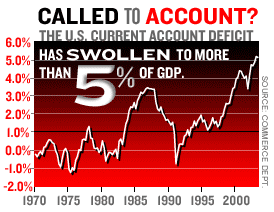NEW YORK (CNN/Money) -
The global economy is profoundly unbalanced, with much of the world overly dependent on the United States for growth and the United States overly dependent on the rest of the world to fuel its appetites.
It is a dangerous state, and it keeps on getting worse, raising the potential for a sharp shift back into balance that comes too fast. The world is in a situation akin to sitting at the fault line between two tectonic plates straining against each other. What you want is a series of little earthquakes that relieve the pressure over time, not the big one.

Little earthquakes were what the Group of Seven (G7) finance ministers were hoping to set off at their weekend meeting in Dubai, United Arab Emirates. With prodding from the United States, the G7 called for "more flexibility in exchange rates for major countries or economic areas to promote smooth and widespread adjustments in the international financial system."
This was widely interpreted as a call for Asian countries to move away from their efforts to boost growth by keeping their currencies weak.
In Japan, in particular, currency intervention has become a coping mechanism to put off much-needed reforms. Rather than going through the structural changes needed to boost domestic demand, and so bring about sustainable recovery, Japan repeatedly has tried to export its way around its problems. Nearly 14 years after the Japanese stock market bubble collapsed, it still hasn't worked.
"These countries need to figure out a way to make their domestic economies grow," Morgan Stanley chief economist Steve Roach said. "If they intensify their efforts to reform because their currencies have strengthened, then the world will be a better place."
For the United States, a dollar that is allowed to float more freely against its major trading partners' currencies is a weaker dollar. This would make the country more competitive globally and also, because a weaker currency is inflationary, help keep deflationary pressures at bay.
It also could help wean the United States from its dependence on the rest of the world for its financing. The current account deficit, the gap in the United States' trade in goods and services with the rest of the world, has swollen to 5.1 percent of gross domestic product.
"The rest of the world has been saving so that we can spend more," Northern Trust chief U.S. economist Paul Kasriel said. "We need to save and let the rest of the world spend more."
Because a weakening dollar puts upward pressure on interest rates, it tends to discourage borrowing and spending while encouraging saving. The effect on other countries, which would be seeing their currencies strengthen, would be just the opposite.
A matter of time
But the key will be for the global adjustment process to occur over time. For other (admittedly lesser) economies, current account deficits above 5 percent have to translate into currency collapses, points out Carlos Asilis, a portfolio manager with the hedge fund Vega Capital Management. Such currency crashes are big enough blows for the world financial system when they occur in emerging markets; a dollar crash would be a nightmare scenario.
In order to prevent the disaster scenario, we can expect to see a lot of deliberate obfuscation by policy makers -- as appeared to be the case Monday when Treasury Secretary John Snow said there was "no change in the strong-dollar policy."
"By introducing noise, they hope the adjustment will be smoother," Asilis said.
The obfuscation may be working. The dollar, which tumbled against the Japanese currency Monday, appeared to stabilize Tuesday, as did Treasury bonds. Stocks managed small gains. (For more on the markets, click here.)
But even a smooth adjustment will not come without pain. If the easy road were bringing the global economy back into balance, after all, it already would have been taken. This isn't true just of countries like Japan, but also of the United States.
Asilis believes that part of the adjustment will entail further selling in U.S. Treasurys as foreign central banks curtail their buying and global investors, wary of the weakening dollar, shift assets elsewhere.
Those higher yields will hit households that already are taking blows from a weak job market. Improved exports will need to take up the slack from softening consumer demand if the economy is going to grow at its potential.
Given the risks, the big question has got to be "Why now?" The U.S. economy, to say nothing of the global economy, is hardly in great shape right now, and absorbing any unintended shocks from a weakening dollar could put the entire recovery process in jeopardy. Wouldn't it be better to wait for a more opportune time to deal with all this?
"People have been saying that for five or six years," Roach said. "You can only put these things off for so long and then the day comes when your realize you're in serious danger."

|

